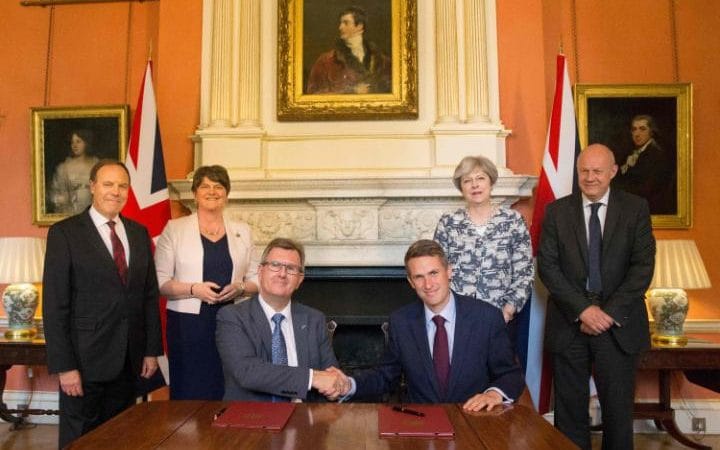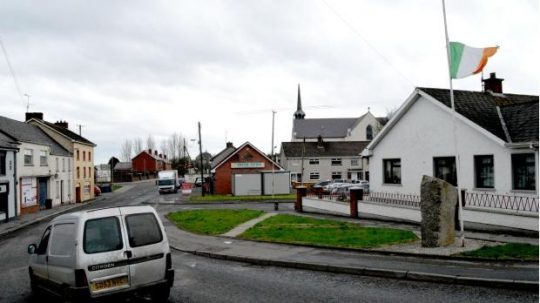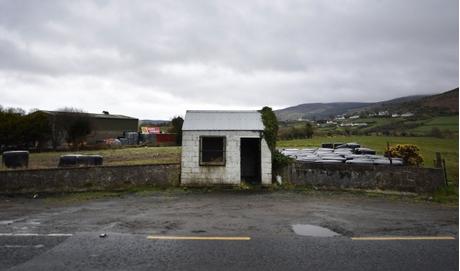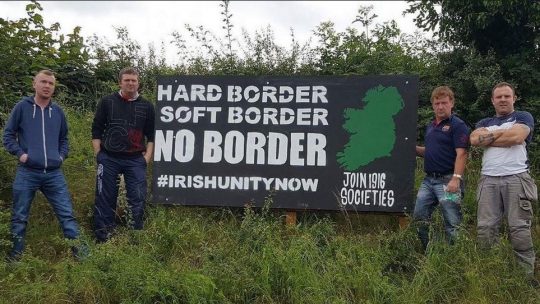Tory £1Bn Confidence and Supply Deal with Ulster’s DUP

On 26th June 2017, UK Prime Minister Theresa May’s returned minority Tory government signed a funding deal with Northern Ireland’s Democratic Unionist Party in exchange for critical support to enable the Tories to govern in Westminster.
In return the party secured £1bn of extra funding, which is allocated mainly to infrastructure and health spending in the country. In return, the DUP undertakes to support the Conservative government in motions of confidence and appropriation or budget votes, by either voting in favour or abstaining.
It means the British government can function with financial confidence and a degree of stability.
 Theresa May with Britain’s First Secretary of State Damian Green (right), Democratic Unionist Party (DUP) leader Arlene Foster (second left), DUP Deputy Leader Nigel Dodds (left), as DUP MP Jeffrey Donaldson (third left) shakes hands with Britain’s Parliamentary Secretary to the Treasury, and Chief Whip, Gavin Williamson.
Theresa May with Britain’s First Secretary of State Damian Green (right), Democratic Unionist Party (DUP) leader Arlene Foster (second left), DUP Deputy Leader Nigel Dodds (left), as DUP MP Jeffrey Donaldson (third left) shakes hands with Britain’s Parliamentary Secretary to the Treasury, and Chief Whip, Gavin Williamson.
Arlene Foster, the leader of the DUP, and Mrs May agreed a £1 billion deal to see the extra funding provided to Northern Ireland over the next two years during talks at Downing Street. The deal also guarantees that there will be no changes made to the state pension triple lock which ensures pensions rise by at least 2.5 per cent every year or to winter fuel payments for pensioners.
Full text of the Agreement between the Conservative Party and the Democratic Unionist Party:
‘In accordance with our shared objectives for strengthening and enhancing the Union, security, prosperity and an exit from the European Union that benefits all parts of the United Kingdom, this letter sets out how the confidence and supply agreement reached between the Conservative Party and Democratic Unionist Party (DUP) will operate to deliver a stable government in the United Kingdom’s national interest for the duration of this Parliament.
Confidence and supply agreement in the UK Parliament
The DUP agrees to support the Government on all motions of confidence; and on the Queen’s speech; the Budget; finance bills; money bills, supply and appropriation legislation and Estimates.
In line with the parties’ shared priorities for negotiating a successful exit from the European Union and protecting the country in the light of recent terrorist attacks, the DUP also agrees to support the Government on legislation pertaining to the United Kingdom’s exit from the European Union; and legislation pertaining to national security.
Support on other matters will be agreed on a case by case basis.
The DUP agrees to support the Government in votes in the UK Parliament, in line with this agreement.
Working Arrangements
In furtherance of these arrangements, the Government and the DUP will work together to ensure the necessary support can be established by both parties to fulfill these arrangements. A co-ordination committee will be convened for this purpose, chaired by the Government. The parties will agree the modus operandi of this committee. The Northern Ireland Secretary will not sit on this committee.
Policy Agreement
Both parties have agreed that there will be no change to the Pensions Triple Lock and the universal nature of the Winter Fuel Payment.
The parties agree to meet the NATO commitment of spending 2 per cent of GDP on the armed forces. Both parties are committed to the Armed Forces Covenant and to its implementation throughout the United Kingdom.
Both parties agreed to work together to consider options to support the highly successful reserve forces in Northern Ireland.
The parties recognise the importance of the agriculture sector to Northern Ireland and the opportunities for growth that exist. Agriculture will be a critical policy areas during the EU exit negotiations.
The parties agree to continue to commit the same cash total in funds for farm support until the end of the Parliament. Further discussions will take place on the future framework for farming support.
Devolved Government in Northern Ireland
As set out in its General Election manifesto, the Conservative Party will never be neutral in expressing its support for the Union. As the UK Government we believe that Northern Ireland’s future is best served within a stronger United Kingdom. We will always uphold the consent principle and the democratic wishes of the people of Northern Ireland. The Conservative Party will never countenance any constitutional arrangements that are incompatible with the consent principle.
Both parties will adhere fully to their respective commitments set out in the Belfast Agreement and its successors. The Conservative Party reiterates its steadfast support for the Belfast Agreement and its successors and, as the UK Government, will continue to govern in the interests of all parts of the community in Northern Ireland.
The UK Government will continue to support close co-operations with the Irish Government and work with them in accordance with the Belfast Agreement and subsequent agreements, while recognising that ultimate responsibility for political stability in Northern Ireland rests with the UK Government.
The DUP recognises the need for early restoration of inclusive and stable devolved government in Northern Ireland and affirms its commitment to agreeing the formation of an Executive. The UK Government will continue to work with the Northern Ireland parties and the Irish Government towards this objective, in full accordance with the three-stranded approach.
Both parties agree on the need to recognise the unique circumstances of Northern Ireland’s history and what effect this has had on the economy and people from all parts of the community. Both parties agree the need for additional support for Northern Ireland as set out in the annex to this agreement.
It is the joint desire of both parties that the elements and provisions of this agreement will play a positive role in the efforts to re-establish devolved government for the benefit of all the people of Northern Ireland.
The DUP will have no involvement in the UK Government’s role in political talks in Northern Ireland. It will continue to participate as a party entitled to form part of an Executive following the last Assembly election, as the other parties do.
Duration of Agreement
The agreement reached will remain in place for the length of the Parliament, and can be reviewed by the mutual consent of both parties. After each parliamentary session, both parties will review the aims, principles and implementation of this agreement.
Signed:
The Rt Hon Gavin Williamson CBE MP, Conservative and Unionist Party
The Rt Hon Sir Jeffrey Donaldson MP, Democratic Unionist Party.’
Defence Secretary, Sir Michael Fallon said: “Let’s be clear – we all have an interest in the future prosperity and security of the province. “This is £1bn that will go to improving some investment, improving the infrastructure of the province, growing the private economy of the province, and ensuring its employment rate – which is behind Wales and Scotland – catches up.”
He said all taxpayers across England, Wales and Scotland have an interest in Northern Ireland “doing better”. “I saw it described, ridiculously today, as some kind of bung to the DUP. The DUP is not getting this money. The money is going to invest in the people of Northern Ireland,” he added.
Northern Ireland voted not to leave EU: Rejoining Republic of Ireland after 96 years would let it stay.
 The Irish flag flies at half-mast in the village of Crossmaglen, Northern Ireland, to mark the passing last week of Martin McGuinness, a nationalist political leader and former IRA member.
The Irish flag flies at half-mast in the village of Crossmaglen, Northern Ireland, to mark the passing last week of Martin McGuinness, a nationalist political leader and former IRA member.
With Brexit underway, there is talk of reuniting Ireland to keep the north in the European
Today, after almost 20 years of stability and peace, Northern Ireland is open and without a physical border, thanks to a common travel area policy that existed before the EU and has continued as a component of the bloc’s border-free treaty structure.
However, with triggering of Article 50 of the Lisbon Treaty, this era of mobility and openness in Northern Ireland might be about to end. The U.K. and EU have exactly two years to agree on the precise terms and conditions of their rupture.
Scotland, which voted to stay in the EU, is adamant about holding another independence referendum rather than being dragged out of the EU against its will.
Northern Ireland, the other region of the U.K. that voted overwhelmingly against leaving, has a failed economy and is unable to survive on its own. It currently receives annual funding from London to the tune of $16.5 billion Cdn — so a Scottish-style bid for independence isn’t viable. Yet there are mounting calls for Northern Ireland to leave the U.K. and reunite, after 96 years of partition, with the Republic of Ireland, an EU member.
The Good Friday Agreement guarantees a path to reunification through a referendum whereby a majority of Northern Irish citizens must vote to leave the U.K. and join the Republic of Ireland.
Until now, that prospect has held no water economically or politically for most people in the province. A pre-Brexit poll, undertaken by the BBC in 2015, showed that only 30 per cent of people in Northern Ireland wanted to split from the U.K.
Then came Brexit. The entire political chessboard in Northern Ireland was shaken.
As the least developed and poorest region of the U.K., Northern Ireland, with a population of just 1.8 million, stands to suffer the most from a hard Brexit.
Crossmaglen, a village some three kilometres from the border with the Republic of Ireland, was a flashpoint of violence between pro-Irish paramilitary groups and the British Army during the “Troubles.” Today, the peace dividend is everywhere to be seen.
Once signs reading “Sniper at Work” dotted the village’s streets. Today, instead, a glitzy retail complex called Casey’s Eurospar plies its morning trade. Customers fill their cars with gas, pick up groceries or grab coffee in the area’s small café. Some 40 per cent of them come from the Republic of Ireland, south of the invisible border.
 A former customs guard hut on the north-south Irish border stands disused in Newry, Northern Ireland.
A former customs guard hut on the north-south Irish border stands disused in Newry, Northern Ireland.
“It would kill this area, business-wise” says Frank McPolin, Casey’s Eurospar supermarket owner. A “hard” Brexit will most likely bring back a closed border with customs checks, and this would wipe out much of Northern Ireland’s significant cross-border retail sector. “We could handle fluctuations between euros and pounds, but we couldn’t deal with a cut-off in the circulation of movement.”
“We’d have to stop farming,” says local farmer Patricia Bellow as she carries bags of groceries to her car. Bellow, like the majority of farmers in Northern Ireland, depends on EU farming subsidies that will disappear with Brexit. Subsidies and grants from the EU currently represent some 85 per cent of farm income here.
All told, Brussels sends $630 million Cdn every year to Northern Ireland in the form of farming, infrastructure and peace-building grants. All this will vanish in 2019.
This spectre of hardship is beginning to cause creaking shifts in Northern Ireland’s once dogged, pro-Union majority position.
Unionists — those in Northern Ireland who identify as British and who wish to remain part of the U.K. — have traditionally been the main obstacle to the reunification of Ireland. But Northern Irish Unionism is currently in deep crisis.
The province’s demographic profile is changing, too. Catholics, once a minority, are expected to tip into majority position soon, perhaps as early as the 2021 census.
And the rigid sectarian culture of Northern Ireland appears to be loosening.
Members of the the Thomas Ashe Society Omagh, the Rising Phoenix Society Derry City, the James Connolly Society Monaghan and the Sean MacDiarmada Society Fermanagh erected a number of billboards during the week calling for ‘Irish Unity Now’, this in response to the British Government’s triggering of Article 50 and the imminent negotiations to effect its withdrawal from the EU.

Speaking afterward, Sean Bresnahan of the Thomas Ashe Society said that “post-the recent ‘Brexit’ vote in the UK and with Britain now negotiating her terms of exit from the European Union, Ireland – both north and south – faces certain upheaval over the months and years to come”.
Continuing, he described Brexit as the “dominant conversation in Irish politics, with much of that discussion centering on whether a ‘renewed’ border – despite it having never gone away – should be a ‘hard border’ or a ‘soft border’, depending on what arrangements are decided on by Britain and the rest of Europe when Brexit has been finalised”.
In Derry, Frankie Quigley of the Rising Phoenix Society said that:
for ourselves, the damage Brexit is certain to do Ireland – in particular the North – which faces acute isolation removed from Europe and on the margins of the so-called United Kingdom – demands neither a hard border or a soft border but an END to the border, with full Irish Unity to proceed in its stead.
Pat Corrigan in Fermanagh added that:
Brexit thus establishes a renewed imperative for Irish Unity and that, with continuing partition set to present major difficulties for all of Ireland, this is now a national priority and indeed THE national priority. On that basis, we propose that the Irish people be afforded their long-denied right to determine their own future, through a national referendum that brings forward an independent all-Ireland republic.
In conclusion, Monaghan’s Mark Campbell described such a republic, which he argued should be “socialist by design”, as:
best-placed to resolve the complex challenges thrown up by Brexit, affording all of the Irish people – both north and south – an opportunity to build a better future, for each of their number, in an Ireland that affords the necessary stability demanded by these uncertain times.
